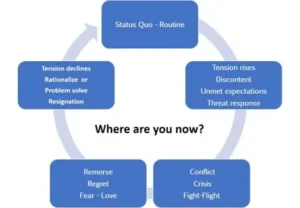If you are researching this subject, you are likely in the limbo phase, which is often one of the most difficult places to be in. Before jumping to hiring a divorce lawyer, let’s take a step back and explore the relationship as it presents itself right now.
Understanding that love goes through many different stages in long-term relationships is an important place to start. You and your spouse will experience these stages many times throughout your time together. The outcome of your relationship will depend on how much you and your spouse want and work for a better relationship.

Ask yourself:
- What do you believe is missing from your relationship that has brought you to this point?
- How well do you listen to your spouse?
- How well does your spouse listen to you?
- How much respect do you show and receive in your everyday interactions with your spouse?
- How do you cope with or respond to your spouse’s criticism or unhappiness?
- How frequently do you communicate your needs and wants? And how does your spouse act on them?
Whether or not a relationship will survive the test of time often comes down to how a couple deals with conflict.
John Gottman, a psychologist and professor emeritus of psychology at the University of Washington, has coined what he calls the 4 horseman of divorce as the leading causes of relationship breakdowns. He explains that communication and decision-making tend to fall apart when couples focus on the negative aspects and faults of one another rather than their positive qualities and strengths. He notes that if partners can recognize and stop these patterns, the likelihood of divorce is lowered.
Take a moment to reflect on your relationship and how it may relate to the below items.
The 4 Horseman And Their Solutions:
Criticism: Criticism refers to a perceived fault or disapproval of someone and often comes across as an attack on a person’s character, whereas a complaint is focused on a specific behavior or action.
The solution is to complain without blame. Use “I statements” when talking about your feelings, and then express a positive need. “What are you feeling?” “What is it that you need?”
Defensiveness: When faced with criticism, our natural response is to become defensive. This is a form of self-protection that is often displayed as indignation or victimhood and results in putting the blame on the other person.
The solution is to accept responsibility for the part you played in the current conflict.
Contempt: Contempt is the biggest indicator of divorce. It stems from a sense of superiority and can be shown through sarcasm, cynicism, name-calling, eye-rolling, mockery.
The solution is to create a culture of gratitude and respect.
Stonewalling: Stonewalling happens when the listener shuts down from the interaction.
The solution is to practice physiological self-soothing. The first step requires you to pause the conflict conversation until you are in a mental position to deal with it effectively to avoid shutting down or blowing up at your spouse.
Reflection questions:
- Which of these habits do you notice in the way your spouse communicates with you? How does this cause you to react?
- Which of these habits do you see yourself using when communicating with your spouse?
- What might happen to your relationship if you stopped using these habits?
- If this is the path you choose, what benefits would you get from avoiding these habits during the divorce process?
If you and your spouse can learn to communicate, be honest, and reconnect, you can find ways to build a new relationship that works for both of you; however, this does require both parties to want to improve the relationship and address their own behaviors and patterns. If you can do this, the result will be something longer-lasting and deeper than before.

